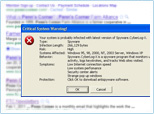 |
Virus Scam, Née Virus Scan
 |
An operator of an online "scareware" scheme will pay more than $8 million in redress to settle FTC charges that he used fake virus scans to trick computer users into buying worthless software. According to the FTC's complaint, the defendant placed ads offering free virus scans to visitors on popular websites. The bogus scans inevitably claimed to detect viruses, spyware, or illegal pornography and urged consumers to buy the defendant's software to remove it. The FTC alleged that the defendants conned more than one million people into paying $40-60 each for products such as Winfixer, Drive Cleaner and Antivirus XP to "fix" a non-existent problem.
|
Immigration Impersonation
 |
At the request of the FTC, a federal judge has shut down a company that allegedly tricked people into sending money — from $200 to $2500 — by pretending to be the U.S. Citizenship and Immigration Services. The FTC complaint alleged that the defendants set up official-looking websites, paid to make sure their sites appeared at the top of immigration-related searches like "USCIS," and answered calls as if they were legitimate immigration caseworkers. Callers sent money to pay processing fees for green card renewals, work visas, and applications for asylum, but according to the FTC, the defendants kept the money, submitted the applications to the USCIS without payment, or charged applicants twice. |
Robo-No
 |
As part of the FTC's crackdown on deceptive prerecorded calls, the Dolce Group Worldwide, LLC, has been shut down. According to the FTC, the Dolce Group conned people into paying thousands of dollars for "extended auto warranties" by telling them that their warranties were about to expire. Only after buying the "warranties" did consumers learn that the company wasn't affiliated with any car manufacturer and didn't provide complete coverage. Fereidoun Khalilian, the owner of the company, is known to the FTC as a result of a 2001 settlement that involved the telemarketing of vacation travel packages. The latest court order bans Khalilian and the Dolce Group from telemarketing or helping others to telemarket, and includes a judgment of more than $4.2 million.
|
Debt Relief Grief
 |
Three companies and their owner have been banned from the debt relief business. According to the FTC, The Hermosa Group and Financial Future Network deceptively advertised debt relief services in English and Spanish-language radio and television ads. The ads claimed that people could pay off their credit card debts for thousands of dollars less than they owed. But the FTC argued that people didn't get help: instead, their names and phone numbers were sold as leads to other companies that paid between $50 and $65 per contact. According to the FTC complaint, the defendants didn't provide debt settlement services and couldn't back up their claims that they — or any other company — could substantially reduce or eliminate anyone's debts.
|
Classic Closeouts Closed Out
 |
The FTC has reached a settlement with Classic Closeouts LLC and its principal, Daniel Greenburg, as part of a crackdown on scammers taking advantage of the economic downturn. The FTC's complaint against Classic Closeouts alleges they stole millions of dollars from consumers by charging to — and debiting from — their bank accounts without their authorization. According to the complaint, the company continued to charge customers for months and years after they bought low-cost clothing or household goods from the Classic Closeouts website. Under the settlement, Greenberg is banned from owning, controlling, or consulting for any Internet-related business that handles personal credit or debit card accounts.
|
Eye Opener
 |
The North Carolina Board of Opticians' proposal to restrict the sale of contact lenses, eyeglasses, and other optical goods in the state is likely to raise costs to consumers unnecessarily, according to FTC staff. Existing federal and state regulations already protect the health and safety of contact lens wearers and others who buy corrective lenses, and require prescribers to give consumers a copy of their prescription so they can comparison-shop for contact lens and eyeglasses. FTC staff suggested that the additional restrictions would increase costs for out-of-state and Internet vendors — and raise the prices North Carolina consumers pay for prescription eyewear.
|
|
|
|
Check out Net Safety Tips On The Go, a free Android app for keeping up with online privacy, safety, and security issues: http://netsafetyapp.org
|
A Call to Curb Cramming
The FTC will host a forum in Washington, DC, on May 11 to discuss creative ways to prevent people from getting crammed — that is, hit with unauthorized third-party charges on their phone bills. Share your idea or opinion by submitting your comment online by April 27th.
A Blog for Business
Looking for quick, informal compliance guidance on privacy and security, marketing and advertising, and credit and finance? You'll find it at the Business Center Blog. From the latest changes to the Telemarketing Sales Rule to the details of the Contact Lens Rule, the Business Center Blog covers key compliance news.
|
|
IN OTHER News:
more > |
 |
Share This:
- Are you and your valentine financially compatible? Take the FTC's fiscal attraction quiz: http://go.usa.gov/Yhi
- National Consumer Protection Week is March 6-12. Visit the NCPW blog for the latest consumer tips and resources: http://go.usa.gov/Yh3
|
|
|






